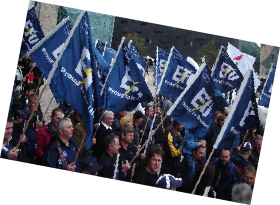Ken Purdham
Bachelor of Arts History & Politics
Diploma of Professional Writing & Editing



In my view, unionism is a belief. It’s the standing together in collective strength for the good of everyone because the voice of many is more likely to be listened to than the voice of the individual. Unions are no more than people standing together in an organised way. As organisations they provide an educated element to a cause, a technical resource and an order of working people. As such unions put forward compelling arguments that the individual may not otherwise be able to. But it’s the standing together of the many that gives strength to the voice of the people. Without that strength, the voice more often than not, is ignored.

Click picture to march back to the top of the page


ETU Historian
Click to ETU website
Historian, Professor Manning Clark once said history was like putting the flesh back on the bones of the past.
In the three hundred thousand plus words of Electrical Trades Union history, through my eyes, there’s been a fair bit of flesh put back on the bones of my union thanks to the facts and figures and the many members who have related their experiences to me over the years.
So, how does my union look? Well, a pretty hansom chap, I reckon. We are, strong, courageous, and respected because we are a members’ driven union.
Putting flesh back on the bones always says to me that history is not just a collection of facts and figures, and an historian is not just someone who can quote them. It says an history takes you back, through the eyes of an historian, to offer an experience of how those facts and figures came about, what price had to be paid and what could have been but for circumstance and determination.
Yes, we know that ninety-
Since then that fledgling collective has gone on to become the powerful group of
twenty-
Throughout the years, the members have stood up to dictate union direction. They’ve stepped up to take on leadership roles rather than leave it to someone else, and because of that, those leaders have had a natural empathy. Time and again the members have held their leadership to account. Time and again they’ve held themselves to account.
During the struggle of the Great Depression years, Arthur McKee, one of the union’s founding members, came out of retirement to front the members and set the standard for standing in self judgement. He accused his peers of being apathetic during those tough times;
You are showing a remarkable apathy in the present crisis. I regret that you younger members do not display the same interest in your affairs as was done years ago when it was necessary to put up a fight for improved working conditions. You’ll never make any progress unless you stick to the union and elect political representatives from your own class.
The union has always been a small membership relative to others but that has been a strength; being able to come together to dictate direction.
In the 1980s, throughout the Kelty-
In the 1990s when the industrial landscape shifted from awards to enterprise bargaining,
the ETU developed enterprise agreements that were second to none and the bane of
right-
In recent times the focus on our trades has enabled us to politically influence governments
to strengthen electrical regulations and put in place forward-
Now, in the twenty first century, the organisation brings its members and delegates together in conferences and mass meetings to have their say. Biennial conferences of elected delegates formalise policy and every four years the membership elects its leaders from those who choose to nominate for the positions of leadership. Its strength is drawn from its membership.
Throughout its history, courage has been the union’s middle name. Members have had the courage to step up into those leadership positions. It has never shied away from the difficult industrial and political decisions needed to be made.
The ETU has had the courage to stand up and face two politically driven Royal Commissions into union corruption and after intense scrutiny came out of both Commissions clear of any wrongdoings, its principles and integrity intact.
It has had the courage to change with the times and to invest in the future of the
trades from those times in the 1920s when it fought to have the trades recognised
as apprenticeship trades to now with its push for trade ‘Continuing Professional
Development’. The union office is not just a union office but a multi-
This great Union has always valued respect. It’s a foundation on which the organisation has stood with due regard for the feelings and rights of others. It has due regard for the position it has in the industrial and political arenas, and it has due regard for the communities within which its members work.
However, the Electrical Trades Union has no more respect than for those union members who have gone before, those who have forged the union into what it is today. Once a year the honorary members are brought together for a lunch and to be addressed by the present leadership and to be given the chance and the right to still rattle the cage as Arthur McKee did all those years ago.
It is a union still small enough for its members to be able to have a controlling voice through mass meetings, conferences and shop or site delegates. The membership could and still does, have the ability to rattle the cage and hold itself and the organisation to account.

Through My Eyes
Read More
Why after 50 years of membership, do I still want to puff my chest out and talk about my union?

